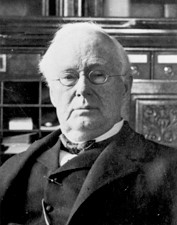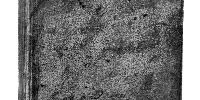William Bradford, second Governor and historian of the Pilgrims, began his “journal” about ten years after they landed. With providential foresight, he said the purpose of history was, “That their children may see with what difficulties their fathers wrestled in going through these things in their first beginnings, and how God brought them along notwithstanding all their weaknesses and infirmities.” The journal itself has an interesting providential journey. After remaining within the Bradford family for a century, it came into the possession of Thomas Prince, pastor of the Old South Church in Boston. Cotton Mather used it when he wrote his Magnalia and royal Governor Hutchinson used it in writing his history of New England by 1767. It survived a fire and flood but was taken by the British when they evacuated Boston in 1776. It was thought lost and destroyed.
 But in 1855, John Wingate Thornton, an accomplished historian, noted that certain notations in the book History of the Protestant Episcopal Church in America, must have come from Bradford’s long lost history, which by this time was in the Bishop of London’s library at Fulham. After several failed attempts to have it returned to America, Senator George Hoar, who grew up loving the Pilgrim story and all of its providences, became determined to bring it back to Massachusetts. He did so while preparing to give his oration at the Pilgrim Society’s 275th anniversary of Forefathers Day in Plymouth, December 21, 1895. He wrote, “In preparing for that duty, I read again, with renewed enthusiasm and delight, the noble and touching story, as told by Governor Bradford. I felt that his precious history of the Pilgrims ought to be in no other custody than that of their children. But the case seemed hopeless.”
But in 1855, John Wingate Thornton, an accomplished historian, noted that certain notations in the book History of the Protestant Episcopal Church in America, must have come from Bradford’s long lost history, which by this time was in the Bishop of London’s library at Fulham. After several failed attempts to have it returned to America, Senator George Hoar, who grew up loving the Pilgrim story and all of its providences, became determined to bring it back to Massachusetts. He did so while preparing to give his oration at the Pilgrim Society’s 275th anniversary of Forefathers Day in Plymouth, December 21, 1895. He wrote, “In preparing for that duty, I read again, with renewed enthusiasm and delight, the noble and touching story, as told by Governor Bradford. I felt that his precious history of the Pilgrims ought to be in no other custody than that of their children. But the case seemed hopeless.”
Senator Hoar took a vacation in England, retracing the steps of the beloved Pilgrims he so admired. He also, “Longed to see the manuscript of Bradford at Fulham.” The Friday before he sailed home, dejected that he had not even been able to see the manuscript, his friend asked him at eleven in the evening if there was anything more he could do for him. Hoar said, “No, unless you happen to know the Lord Bishop of London. I should like to get a sight at the manuscript of Bradford’s history before I go home.” Amazingly he said, “…Mr. Grenfell, at whose house you spent a few days in the early summer, married the bishop’s niece, and will gladly give you an introduction to his uncle.” Providentially, the day before Hoar sailed home, the Bishop agreed to show him The Log of the Mayflower as it was called!
Hoar exclaimed to the Bishop after holding the manuscript “My lord, I am going to say something which you may think rather audacious. I think this book ought to go back to Massachusetts.” The response of the Bishop became famous, “I did not know you cared anything about it.” Senator Hoar, along with the American Antiquarian Society, Massachusetts Historical Society, Pilgrim Society of Plymouth and the New England Society of New York, along with Governor Roger Wolcott of Massachusetts, official permission was granted. Senator Hoar summarized this remarkable and interesting providence of God when he said, “The rarest good fortune seems to have attended every step in this transaction… Our fathers knew the secret to lay, in Christian liberty and law, the foundations of empire. Our young men are not ashamed, if need be, to speak with the enemy in the gate… I do not think many Americans will gaze upon it (original manuscript) without a little trembling of the lips and a little gathering of mist in the eyes, as they think of the story of suffering, of sorrow, of peril, of exile, of death and of lofty triumph which that book tells… there is nothing like it human annals since the story of Bethlehem.”







